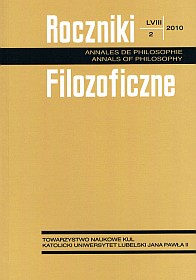The Problem of mentalese
Abstract
In the present article I critically analyze the conception of the “language of thought” formulated by J. Fodor, and I suggest a solution of the question of the relation between the language and thought that refers to the studies of intentionality conducted by E. Husserl. I argue that our (mono-subjective) thinking is not reducible to the language (especially understood in the cybernetic way), and mental processes that we usually recognize as verbalized ones, are in fact operations on specific intentional forms that are not language units at all, but are our formulation of phrases (spoken, written, and so on). I question both the physicalist view of the issue of internalization of the language and the use of it in mental processes, and the position that perceives these processes as exclusively (or first of all) linguistic ones.
According to the conception I suggest the natural language is intentionally transformed, de-verbalized, by the subject, and the intentional forms, by means of which the subject of cognition performs acts of “linguistic” thinking, have a subjective character, analogous to the intentional forms that take part in processes of recognizing external objects. The subject does not assume a metalinguistic attitude in the acts of thinking, but an attitude directed to the objects it thinks about. This objective character is also revealed in communicating with other subjects, and it does not have (as is usually assumed) the character of coding/decoding the message, but is an interpretation of defined objective domains, that is objects, that are the theme of the subjects’ communication.
References
Aitchison Jean: Words in Mind. Introduction to the Mental Lexicon, Oxford: Basil Blackwell 1987.
Aitchison Jean: Ziarna mowy, tł. M. Sykurska-Derwojed, Warszawa: PIW 2002.
Aydede Murat: Language of Thought: The Connectionist Contribution, „Minds and Machines” 7 (1997), s. 57-101.
Bechtel William: Mental Mechanisms. Philosophical Perspectives on Cognitive Neuroscience, New York: Routledge 2008.
Beckermann Ansgar: Can there Be a Language of Thought, w: R. Casati, B. Smith and G. White (red.), Philosophy and the Cognitive Sciences. Proceedings of the 16th International Wittgenstein Symposium. Wien: Hölder-Pichler-Tempsky 1994, s. 207-219.
Bloom Paul: How Children Learn the Meaning of Words, Cambridge: The MIT Press 2000.
Carston Robyn, Thoughts and Utterances. The Pragmatics of Explicit Communication, Oxford: Blackwell Publishing 2002.
Carruthers Peter: The Architecture of the Mind. Massive Modularity and the Flexibility of Thought, Oxford: Oxford University Press 2006,
Cognitive Aspects of Biligualism, red. I. Kecskes i L. Albertazzi, Dordrecht: Springer 2007.
Dennett Daniel C.: Psychosemantics (review), „The Journal of Philosophy” 85.7 (1988), s. 384-389.
From Perception to Meaning. Image Schemas in Cognitive Linguistics, red. B. Hampe, Berlin: Mouton de Gruyter 2005.
Fodor Jerry: Concepts. Where Cognitive Science Went Wrong, Oxford: Clarendon Press 1998.
Fodor Jerry: Eksperci od wiązów. Język myśleński i jego semantyka, tł. M. Gokieli, Warszawa: Aletheia 2001.
Fodor Jerry: Hume Variations, New York: Oxford University Press 2003.
Fodor Jerry: Psychosemantics, Cambridge: The MIT Press 1987.
Fodor Jerry: Special Sciences (Or: the Disunity of Science as a Working Hypothesis), „Synthese” 28 (1974), 97-115.
Fodor Jerry: The Appeal to Tacit Knowledge in Psychological Explanation, „The Journal of Philosophy” Vol. 65, No. 20, Sixty-Fifth Annual Meeting of The American Philosophical Association Eastern Division (Oct. 24, 1968), s. 627-640
Fodor Jerry: The Language of Thought, New York: Thomas Y. Cromwell Company 1975.
Fodor Jerry: The Modularity of Mind, Cambridge: The MIT Press 1983.
Grodziński Eugeniusz: Monizm a dualizm. Z dziejów refleksji filozoficznej nad myśleniem i mową, Wrocław: Ossolineum 1978.
Gut Arkadiusz: O relacji między myślą a językiem, Lublin: TN KUL 2009.
Hacker Peter: Languages, Minds and Brains, w: C. Blakemore and S. Greenfield (red.), Mindwaves: Thoughts on Intelligence, Identity and Consciousness, Oxford: Blackwell, 1987, 485-505.
Husserl Edmund: Badania logiczne, t. II, cz. I i II, tł. J. Sidorek, Warszawa: PWN 2000.
Husserl Edmund: Ding und Raum. Vorlesungen 1907, red. U. Claesges, Haag: Martius Nijhoff Publishers 1973.
Jakobson Roman: W poszukiwaniu istoty języka. Wybór pism, t. 1, red. M. R. Mayenowa, Warszawa: PIW 1989.
Judycki Stanisław: Hipoteza „języka myśli” i jej krytyka, w: Mózg i jego umysły, red. Wioletta Dziarnowska i Andrzej Klawiter, Warszawa: Zysk i S-ka 2006, s. 199-216,
Judycki Stanisław: Znaczenie introspekcyjne, „Roczniki Filozoficzne” 51 (2003), z. 1, s. 5-52,
Kurcz Ida: Psychologia języka i komunikacji. Wydanie nowe, Warszawa: WN „Scholar” 2005.
Language in Mind – Advances in the Study of Lnguage and Thought, R. Gentner i S. Goldin-Meadow (red.), Cambridge: The MIT Press 2003.
Mental Representation, red. S. Stich i T. Warfield, Blackwell Publishers, Cambridge 1994.
New Essays on Semantic Externalism and Self-Knowledge, red. S. Nuccetelli, Cambridge: The MIT Press 2003.
Nosal Czesław: Psychologiczne modele umysłu, Warszawa: PWN 1990.
O rozwoju języka i myślenia dziecka, red. S. Szuman, Warszawa: PWN 1968.
Pinker Steven: A Reply to Jerry Fodor on How Mind Works, „Mind and Language” 20.1(2005), s. 33-38,
Pinker Steven, The Stuff of Thought. Language as a Window into Human Nature, New York: Viking 2007.
Pollock John L.: Language and Thought, Princeton: Princeton University Press 1982.
Przywara Paweł: Idealizm Husserla – problemy interpretacyjne 2009 (http://portal.wsiz.rzeszow.pl/strona.aspx?id=12769)
Przywara Paweł, W poszukiwaniu nowego modelu komunikowania. Rozważania epistemologiczne, 2008 (http://portal.wsiz.rzeszow.pl/strona.aspx?id=9944) [w druku].
Przywara Paweł: Epistemologiczne aspekty komunikowania, [w:] Media światem człowieka, red. M. Drożdż, I. S. Fiut, Kraków: Wydawnictwo „Jedność” 2009, s. 59-74.
Przywara Paweł: Mentalizm 2006 (http://portal.wsiz.rzeszow.pl/strona.aspx?id=6356).
Stępień Antoni: Studia i szkice filozoficzne, t. 1, Lublin: RW KUL 1999.
Quine Willard v. O.: Słowo i przedmiot, tł. C. Cieśliński, Warszawa: Aletheia 1999.
Copyright (c) 2010 Roczniki Filozoficzne

This work is licensed under a Creative Commons Attribution-NonCommercial-NoDerivatives 4.0 International License.





